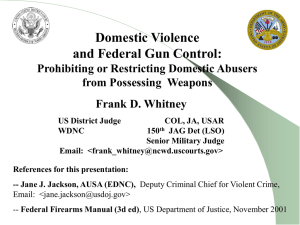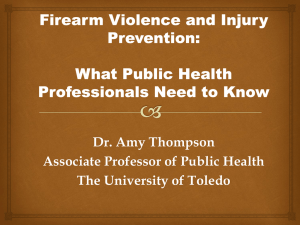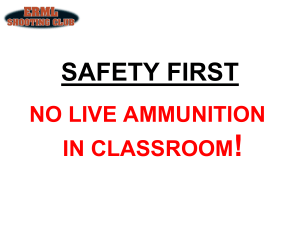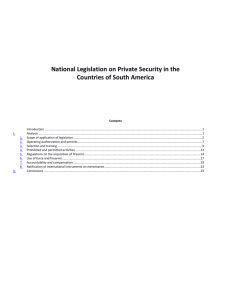firearms amendment b.. - Gun Owners of South Africa
advertisement
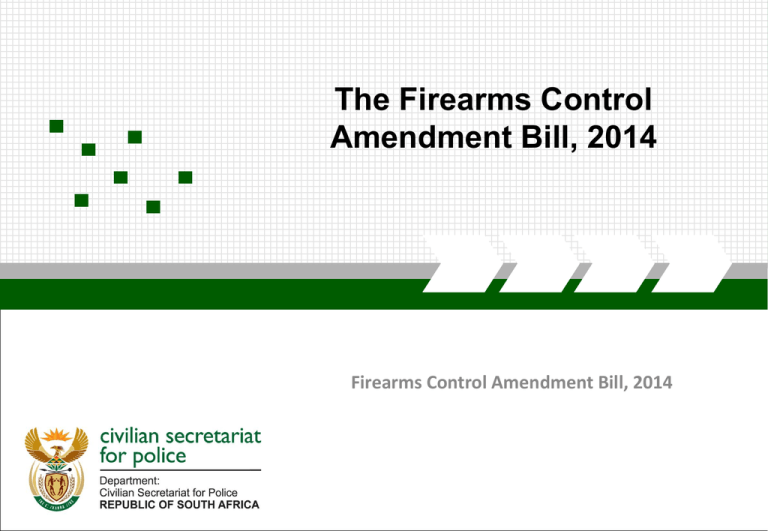
The Firearms Control Amendment Bill, 2014 Firearms Control Amendment Bill, 2014 CIVILIAN SECRETARIAT FOR POLICE BACKGROUND • The Firearms Control Amendment Bill, 2014 seeks to strengthen the Firearms Control Act, 2000 (“the principal Act”) by addressing identified gaps and weaknesses, in addition to inserting new clauses. • The Bill was drafted by a joint Drafting Team consisting of legal officials of the Civilian Secretariat for Police and the South African Police Service. The Bill was also presented to the JCPS Development Committee on the 29 September 2014 and approval was given for the Bill to be submitted to the JCPS DG’s Committee. • Some of the gaps and weakness in the principal Act emanate from the report and recommendations of a Task Team appointed by the previous Minister of Police to enquire into the functioning of the Central Firearms Register. In addition, some deficiencies in the Firearms Control Amendment Act, 2006 (Act No. 28 of 2006) were also identified and addressed in the Bill. • Whilst consultations were held with some identified stakeholders, the Bill was not published in the Gazette for public comments as originally intended. The visit of the Portfolio Committee to the Central Firearm Registry in SAPS on the 23 September 2014 resulted in the Committee requesting the Civilian Secretariat for Police to urgently submit the Bill to Parliament during October 2014. • The Bill has already been submitted to the Office of the Chief State Law Adviser for preliminary certification and this certification is expected before the Bill is submitted to the JCPS Cabinet Committee meeting of the 30 October 2014. 4/13/2015 CIVILIAN SECRETARIAT FOR POLICE 2 KEY PROVISIONS OF THE BILL The Bill deals with mainly technical amendments. The following key amendments are, however, highlighted – • Clause 2 provides for accredited associations in respect of sports shooting, hunting, including professional hunting, as well as firearms collectors to verify applications for possession of firearms and ammunition made by members of the association, the suitability of the firearm applied for and the motivation for the application. • A competency certificate is a prerequisite for the issuing for a firearm licence. Clause 4 seeks to amend section 10 of the Act by seeking to make all competency certificates issued in terms of this section valid for 10 years from the date of issue, thereby providing for a uniform period of validity. The amendment also seeks to make a competency certificate to possess a firearm as a private collector to be also valid for an application to possess a firearm for self-defence, occasional hunting or occasional sports shooting purposes; • Clause 6 seeks to amend section 15 of the principal Act by providing that a fifth licence relating to a cap-and-ball firearm may be issued to a person who already holds the maximum licences permitted under both section 13 and 15 of the principal Act. Section 13 provides that no person may hold more than one licence for self-defence purposes and section 15 provides that, where a person already holds a self defence licence, such person may not hold more than three licences issued under section 15 (a handgun, or a rifle or shotgun which is not a restricted firearm). 4/13/2015 CIVILIAN SECRETARIAT FOR POLICE 3 KEY PROVISIONS OF THE BILL (contd.) • • • Clause 9 seeks to place an obligation on owners of firearms licensed for private security business purposes to have their firearms ballistically sampled in accordance with a program published by the Minister in the Gazette. It also provides that whenever a firearms licence in the possession of a private security service provider is renewed or there is a change of ownership, the original owner must ensure that the firearm is submitted to the DFO for ballistic sampling before the renewal or before the ownership is transferred Clause 21 seeks to provide for the ballistic testing of firearms in possession of official institutions and for the results of ballistic sampling to be placed on Integrated Ballistic Identification System (IBIS) for the purposes of investigating crimes committed with firearms. It also provides for the Minister, by notice in the Gazette, to determine the date by which firearms in the possession of an Official Institution must be ballistically sampled. Clause 22 provides for a Designated Firearms Officer (“DFO”) to be designated at each police station to improve control over firearms in possession of the police and other Official Institutions and private security service providers. The clause makes the DFO responsible solely for matters relating to the Act and places clear duties that the DFO must perform. These duties include – – – – – processing of applications for competency certificates, licences and authorisations; ensuring compliance by police members regarding the possession and use of official firearms, as well as ensuring that official firearms are issued to a member who has undergone the prescribed competency test and has been issued with a permit to possess such firearm; conducting inspections at Official Institutions and business premises of private security service providers; ensuring that all firearms and ammunition destined for destruction are inspected by the SA Heritage Resources Agency as well as submitted to the Forensic Science Laboratory for ballistic tests. 4/13/2015 CIVILIAN SECRETARIAT FOR POLICE 4 KEY PROVISIONS OF THE BILL (contd.) • • • Clause 23 places duties on commanders and station commissioners with regard to firearms kept at police stations, disciplinary steps to be taken against members who have lost firearms, the reporting of losses of official firearms and ammunition and the investigation of such losses, the regular and random inspections of official registers. Clause 24 provides for the Minister to appoint at least five members of the Appeal Board, instead of a maximum of five members, to take into account the workload of the Board or other exceptional circumstances. In addition, the clause clearly delineates the functions of the Board. Clause 28 provides for a transitional provision in respect of the licensing of percussion/cap-and-ball firearms by providing a period of 18 months to license percussion/cap-and-ball firearms without fear of prosecution. The clause also provides that all Official Institutions must within one year comply with Chapter 11 of the Act that relates to the possession and use of firearms by Official Institutions and the keeping of Registers. The clause also provides that firearms licences issued under the repealed Arms and Ammunition Act, 1969 will remain valid for a period of two years from the coming into operation of the Firearms Control Amendment Act. This transitional provision seeks to address the High Court interim Order that recognizes the validity of licences issued under the Arms and Ammunition Act. The matter cannot be resolved other than by means of an amendment to the principal Act as the transitional period of the re-licensing has expired. The transitional provision in the Bill provides for the period within which all licences issued under the Arms and Ammunition Act must be renewed, but that the number of firearms that will be re-licensed will be restricted to the number in the principal Act. 4/13/2015 CIVILIAN SECRETARIAT FOR POLICE 5 CONSULTATIONS • The draft Bill was consulted with interested groups including dealers, collectors and trainers. These groups included – • The International Firearms Training Academy (IFTA) • The Professional Hunters Association (PHASA) • The SA Hunters and Game Conservation Association • The SA Gun Owners Association • SA WingShooters Association • SA Sports Shooting Federation • The provisions relating to percussion/cap-and-ball firearms were inserted following representations by the National Association of Arms and Ammunition Collectors of South Africa (NAACSA). 4/13/2015 CIVILIAN SECRETARIAT FOR POLICE 6 ORGANISATIONAL AND PERSONNEL IMPLICATIONS • The appointment of Designated Firearms Officers at each police station and the training of DFOs will spread the workload and improve the application process as well as access by the public to services. • The appointment of additional members to the Appeal Board will enhance the capacity of the Board to deal with appeals more effectively and speedily. • The Central Firearms Register (CFR) in SAPS is developing a turn-around strategy to improve the functioning of the CFR and the implementation of the Act. CIVILIAN SECRETARIAT FOR POLICE 7 FINANCIAL IMPLICATIONS FOR THE STATE . • Additional costs such as the appointment of additional members to the Appeal Board will be provided for in the budget of the Civilian Secretariat for Police. • The costs relating to the appointment and training of Designated Firearm Officers for each police station will be borne by SAPS. • The costs relating to ballistic sampling of firearms will be borne by the licence holder and, where applicable, Official Institutions. CIVILIAN SECRETARIAT FOR POLICE 8 PARLIAMENTARY PROCEDURE • The Bill should be dealt with in terms of the procedure established by section 75 of the Constitution of the Republic of South Africa, 1996, since it contains no provision to which the procedure set out in section 74 or 76 of the Constitution applies. NB: The draft Bill has already been submitted the Office of the Chief State Law Adviser for certification and the Chief State Law Adviser has indicated that the certification is being given priority attention. 4/13/2015 CIVILIAN SECRETARIAT FOR POLICE 9 Q&A THANK YOU 4/13/2015 CIVILIAN SECRETARIAT FOR POLICE 10
